
As violence flares once again between Israel and Gaza, a surprising reality emerges: even among Prime Minister Benjamin Netanyahu’s harshest critics, there is widespread support for Israel’s military campaign in Gaza. While debate and dissent are staples of Israeli democracy, with protests often erupting over issues like judicial reform, corruption, and economic policies, the antiwar movement in Israel remains muted. Unlike in many other nations where conflict often sparks large peace demonstrations, Israel’s anti-war voices are few and far between, and the reasons are complex.

This apparent consensus raises questions about the factors influencing public opinion and the obstacles facing those who oppose the military campaign. From historical trauma and a deep-seated security mindset to polarized politics and international criticism, various factors play into the subdued nature of antiwar sentiment in Israel today.
The Legacy of Security and Existential Threats
Israel’s history is marked by repeated conflicts and wars, which have instilled a national consciousness focused on survival. Since its founding in 1948, Israel has faced continuous threats from neighboring countries and militant groups, shaping an enduring belief that a strong defense is essential to the country’s existence. The Israel Defense Forces (IDF) are highly respected, and mandatory military service creates a shared experience of national defense across all sectors of society. This mindset makes it challenging for an antiwar position to gain widespread support, as many Israelis view military action as a necessary measure of protection.
Collective Trauma and Fear of Instability
The recurring trauma of rocket attacks and bomb shelters, particularly for communities near Gaza, reinforces a sense of vulnerability. For many Israelis, these experiences translate into a belief that a strong military response is essential to prevent instability and protect civilians. This trauma contributes to the public’s reluctance to oppose military actions, as antiwar sentiment can be perceived as undermining security and putting lives at risk.
Political Consensus on Security Issues
While Netanyahu faces criticism from opposition leaders on issues like corruption and governance, there is near-universal political agreement on the need to defend against Hamas and other militant groups in Gaza. Major opposition parties, such as Yesh Atid and Blue and White, largely support military action, viewing it as a matter of national security rather than partisanship. This consensus leaves little room for antiwar positions within the mainstream political arena, with antiwar advocates often marginalized or dismissed as too extreme.
Although small factions like Meretz and elements within the Arab Joint List advocate for peace, they remain peripheral in Israeli politics. Mainstream leaders generally avoid endorsing anti-war rhetoric for fear it may be seen as unpatriotic or a show of weakness. For many Israelis, taking a firm stance on defense transcends political affiliations, meaning that antiwar voices find it difficult to resonate with the broader public.
Broad Public Support for Military Action in Gaza
Hamas, which governs Gaza, is widely viewed in Israel as a terrorist organization dedicated to Israel’s destruction. This perception creates broad public consensus around the necessity of military action, regardless of political views. While casualties in Gaza often evoke international concern, many Israelis see these operations as necessary to dismantle Hamas’s capabilities and ensure the safety of Israeli civilians. Public support for military actions in Gaza remains high, even among those critical of Netanyahu’s administration.
Government and media portrayals of the Gaza conflict often emphasize Israel’s need for self-defense and the IDF’s efforts to avoid civilian casualties. This framing reinforces the legitimacy of military actions, making it difficult for antiwar narratives to gain traction. Israeli media’s focus on the experiences of communities under rocket fire, along with official government statements, shapes public opinion in a way that bolsters support for military campaigns.
International Criticism and National Solidarity
International criticism of Israel’s military actions often has an unintended effect domestically, strengthening public support for the campaign. Many Israelis feel that the global community does not fully understand the security threats they face and view international condemnation as unfairly biased. This perception fuels a sense of national solidarity as Israelis unite in defense of their country’s right to self-protection, further dampening antiwar sentiment.
Israel’s strong alliances, particularly with the United States, provide it with the diplomatic backing needed to sustain military campaigns. This support reassures the Israeli public that their nation’s defense measures are validated on the global stage, mitigating the impact of opposition from some international human rights organizations and European nations. With such backing, the government faces minimal pressure to restrain its military operations.
Challenges Facing Peace Activism in Israel
Civil society groups advocating for peace, like Peace Now and Breaking the Silence, operate in a challenging environment. While they call for dialogue and a reduction in military actions, these groups often face backlash, with their members being labeled as disloyal or out of touch with mainstream values. This public hostility discourages broader participation in the peace movement, leaving antiwar activists marginalized and with limited influence.
The decline of the two-state solution as a viable pathway to peace has further weakened anti-war voices. Many Israelis no longer believe in the prospect of a negotiated peace with Hamas, viewing military action as the only practical means of ensuring security. Without a widely accepted diplomatic alternative, calls for restraint in Gaza are seen as unrealistic or even dangerous.
Why Israel’s Anti-War Movement Remains Small
While Israel has a vibrant culture of protest and political discourse, the lack of a robust antiwar movement in response to the Gaza conflict is striking. Rooted in decades of security challenges, trauma, and political polarization, the Israeli public largely sees military action as essential to ensuring safety and stability. The combination of political consensus, public opinion, and international dynamics creates an environment where antiwar voices find little resonance. Until alternative solutions for lasting security and peace emerge, Israel’s anti-war movement is likely to remain on the sidelines, unable to gain substantial traction amid ongoing conflict.

